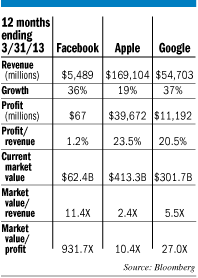Subscriber Benefit
As a subscriber you can listen to articles at work, in the car, or while you work out. Subscribe Now
 Facebook’s initial public offering on May 17, 2012, was the most highly anticipated IPO since Google’s in 2004. Many investors embraced the hype that Facebook stock was a “must own/can’t lose” proposition.
Facebook’s initial public offering on May 17, 2012, was the most highly anticipated IPO since Google’s in 2004. Many investors embraced the hype that Facebook stock was a “must own/can’t lose” proposition.
As we know now, Facebook’s $38-a-share IPO turned out to be a fiasco from the moment NASDAQ catastrophically botched the opening of trading. While the stock has recovered from its September 2012 low of $17.55 to around $26, investors who bought the IPO have still lost more than 30 percent of their investment.
Hindsight is 20/20, but what are the lessons learned and what might the future bring?
 The red flags in the month leading up to the IPO were abundant:
The red flags in the month leading up to the IPO were abundant:
• In an update to its prospectus on April 23, 2012, Facebook revealed that for the quarter ending March 31, 2012, its revenue growth slowed and growth in expenses accelerated.
• Because of high investor demand for the IPO, on May 15 Facebook increased the price range from $28 to $35 a share to $34 to $38 a share.
• The next day, Facebook increased the number of shares to be sold in the IPO 25 percent. Important to note, company insiders, who know more about the company’s prospects than anyone else, held 57 percent of the shares to be sold in the deal.
The investing public has lost more than $5 billion on the IPO, but there were winners. Insiders received more than $9 billion for the shares they sold. Facebook received almost $7 billion. The underwriters of the IPO, led by Morgan Stanley, J.P Morgan and Goldman, Sachs took home a tidy $176 million.
Back then, I compared Facebook to two other fast-growing technology companies, Apple and Google. I argued that, based on revenue growth and profitability, it was difficult to justify the premium valuation Facebook would command at $38 a share. If you look at the current market values of the three companies relative to revenue and profit, Facebook still looks expensive at $26 a share.
Price is what you pay. Value is what you get. There is no such thing as a good or bad investment, regardless of price. Regarding IPOs, be especially wary when the price and number of shares sold are increased and insiders are selling.•
__________
Kim is the chief operating officer and chief compliance officer for Kirr Marbach & Co. LLC, an investment adviser based in Columbus, Ind. He can be reached at (812) 376-9444 or [email protected].
Please enable JavaScript to view this content.
